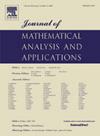Global well-posedness for the Cauchy problem of a system of convection–diffusion equations in the critical uniformly local space
IF 1.2
3区 数学
Q1 MATHEMATICS
Journal of Mathematical Analysis and Applications
Pub Date : 2025-03-22
DOI:10.1016/j.jmaa.2025.129508
引用次数: 0
Abstract
We establish the time global well-posedness of the Cauchy problem for a convection–diffusion system of diagonal type in uniformly local Lebesgue spaces . Our well-posedness result also demonstrates the existence of almost periodic solutions or non-zero asymptotic boundary conditions within the functional analytic framework, extending the scalar case presented in [18]. For local well-posedness, we apply uniformly local - estimate for the heat evolution operator and the Banach-Caccioppoli fixed point theorem, following the approach in [18]. The time global well-posedness of the system, including the scaling critical case, is established by demonstrating that the solution of a single equation derived from the system satisfies a uniform bounded estimate, despite the absence of conservation laws. The proof is based on the Bernstein type argument for deriving the global a priori estimate (cf. [19]).
临界一致局部空间中对流扩散方程组Cauchy问题的全局适定性
建立了一致局部Lebesgue空间Lulocr(Rn;Rm)上对角型对流扩散系统Cauchy问题的时间全局适定性。我们的适定性结果也证明了在泛函解析框架内几乎周期解或非零渐近边界条件的存在性,扩展了[18]中给出的标量情况。对于局部适定性,我们应用热演化算子的一致局部Lulocp- Lulocq估计和Banach-Caccioppoli不动点定理,遵循[18]中的方法。通过证明在没有守恒律的情况下,由系统导出的单个方程的解满足一致有界估计,建立了系统的时间全局适定性,包括标度临界情况。该证明是基于Bernstein类型的论证,用于推导全局先验估计(参见[19])。
本文章由计算机程序翻译,如有差异,请以英文原文为准。
求助全文
约1分钟内获得全文
求助全文
来源期刊
CiteScore
2.50
自引率
7.70%
发文量
790
审稿时长
6 months
期刊介绍:
The Journal of Mathematical Analysis and Applications presents papers that treat mathematical analysis and its numerous applications. The journal emphasizes articles devoted to the mathematical treatment of questions arising in physics, chemistry, biology, and engineering, particularly those that stress analytical aspects and novel problems and their solutions.
Papers are sought which employ one or more of the following areas of classical analysis:
• Analytic number theory
• Functional analysis and operator theory
• Real and harmonic analysis
• Complex analysis
• Numerical analysis
• Applied mathematics
• Partial differential equations
• Dynamical systems
• Control and Optimization
• Probability
• Mathematical biology
• Combinatorics
• Mathematical physics.

 求助内容:
求助内容: 应助结果提醒方式:
应助结果提醒方式:


